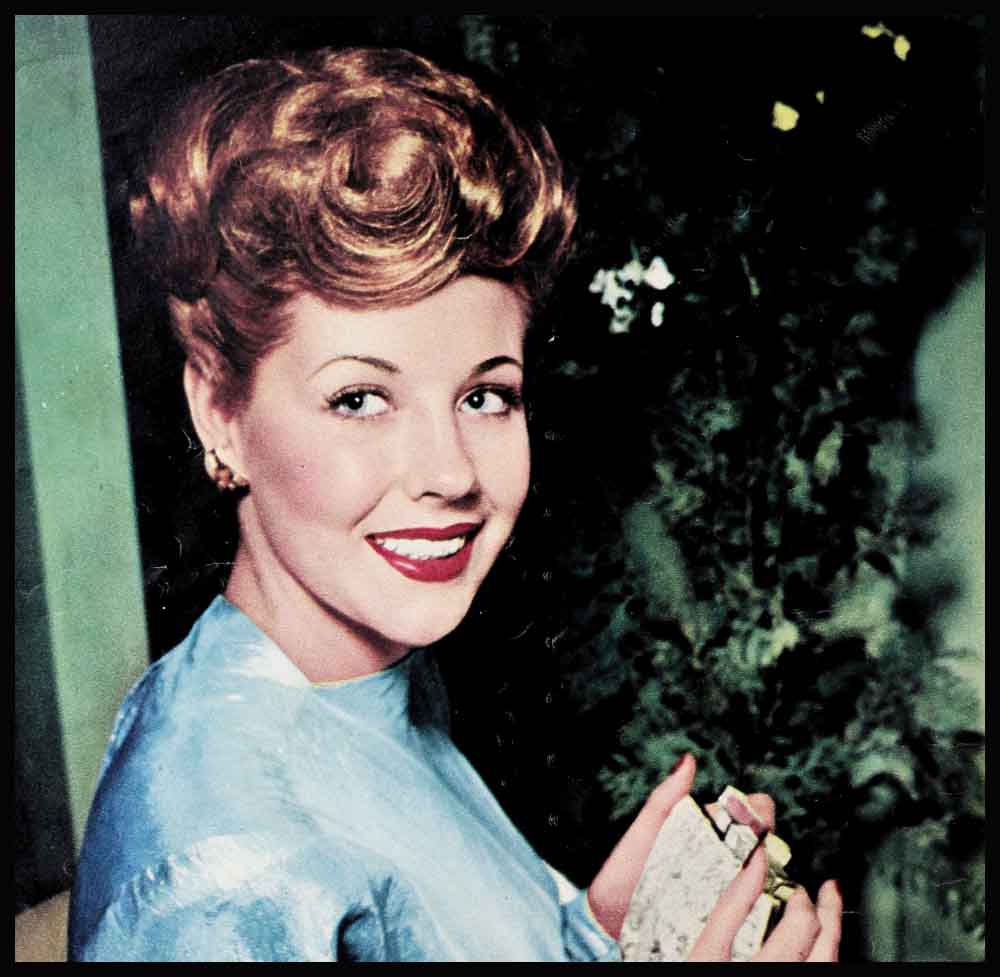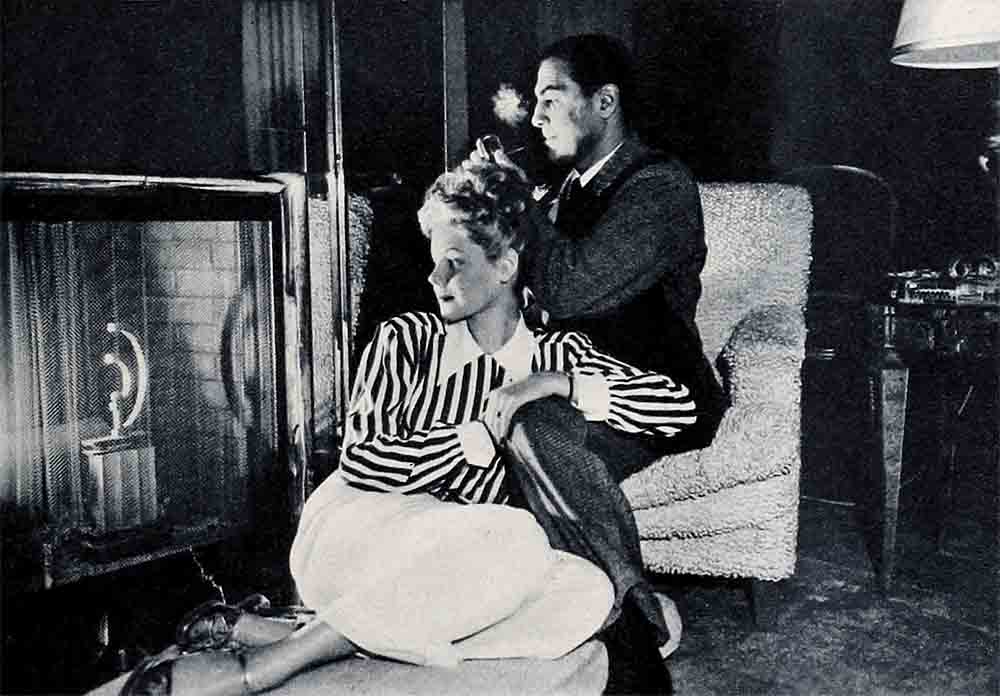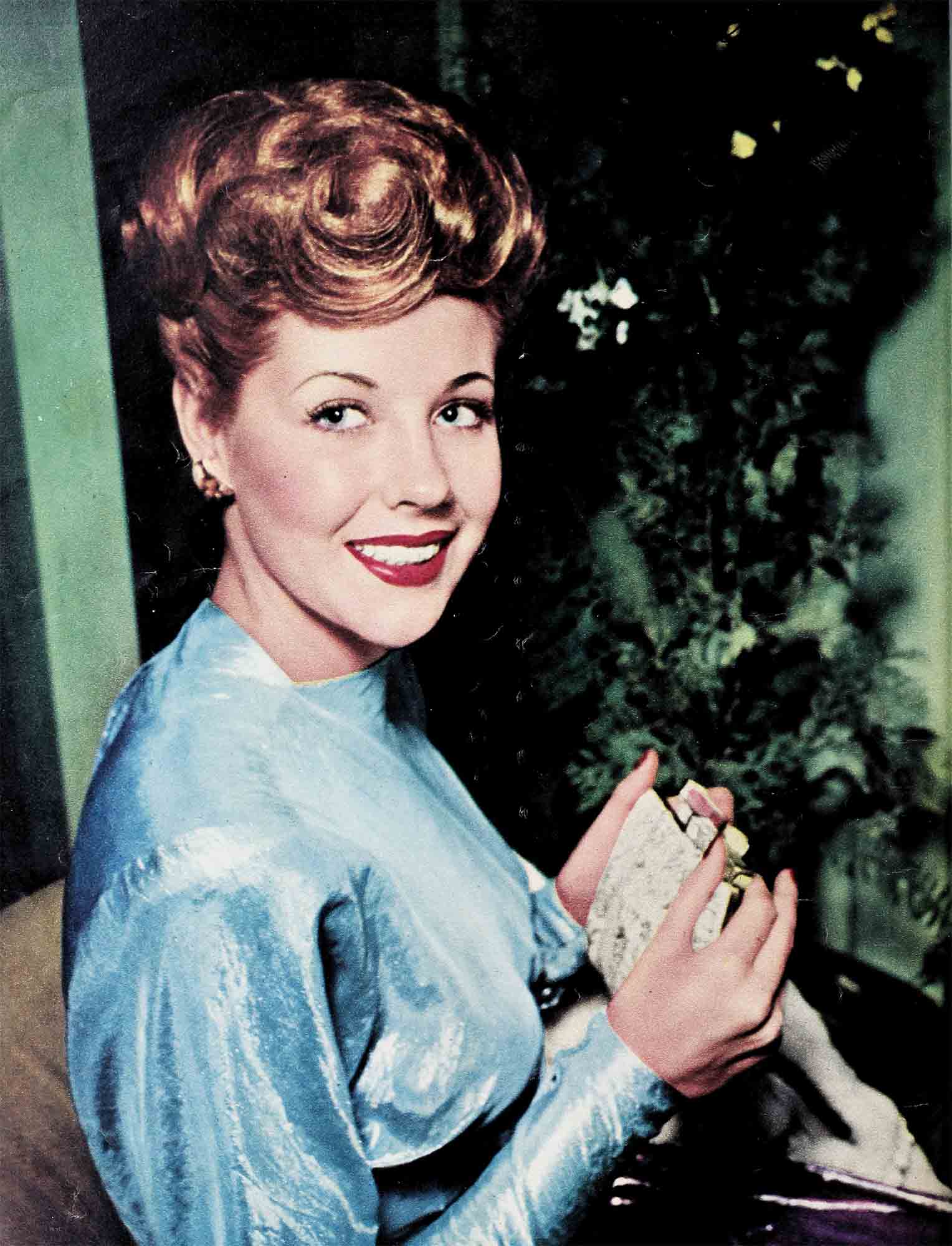
“Every Time I leave You”
“Every time I leave you, some|f thing happens,” Vic Orsatti tells his beautiful wife Marie McDonald. It is both a boast and a complaint, the way he says it, with an over-all feeling of resignation. He knows Marie will go right on being true to her impulses; that off the screen and on she will play her scenes with a high sense of comedy or drama—and her tongue in her cheek.
Practically up until the day they were married Vic and Marie disliked each other. Vic thought Marie was a silly kid. Marie thought Vic was an egotist. Their conversation was tinged with sulphurous sarcasm. Fortunately, they didn’t see each other often. Vic, a top-flight agent, spent most of his time with top-flight stars. Marie, previously a singer with Tommy Dorsey’s band and comparatively new to Hollywood,was serving her apprenticeship at Universal Studios. The fact that she was getting nowhere may very well have been due to the fact that her time and energy were largely absorbed socially. The eternal Hollywood man shortage, exaggerated by the war, was something she knew nothing about. Considering the pride men know in being seen with a girl other men tum to look at, it’s easy to understand the constant stream of gentlemen who always were trying to date her. Aware of her warm gaiety it’s also easy to understand why steady dates, too, jammed her calendar.
At first, Marie admits, her popularity made her deliriously happy.
“Then,” she says, “I began to feel the way you do when you’ve been too long on a merry-go-round—a little ill. Also too dazed to do anything. I wasn’t happy, certainly; only restless and dissatisfied.”
One of Marie’s dates, a blond and titled Englishman, was so determined and persuasive that she really considered marrying him. Until they went to Elmer’s, a little after-hour-spot, and she had her fortune told.
“The palmist at Elmer’s told me that before the year was up I would break my contract and sign a new one,” Marie says. “And that in the early part of the new year I would be married to a man I had known for a long time, a man with dark eyes, dark hair and a dark complexion.”
Marie’s Englishman laughed at that prophecy. The palmist, however, shook her head and said quietly, “You will see! Everything I told her is in her hand, plain as day!”
“I kept trying to think of someone I had known for a long time who was dark,” Marie says. “Vic never occurred to me. Even when I left Elmer’s that night and was attracted by a light burning in Vic’s office which, curiously enough, was just across the Street, I didn’t consider him for one minute.”
Then, out of a clear sky, Vic telephoned her. Did she have a certain girl’s telephone number? She gave it to him and thought no more about it. He called a second time for a second number. He called a third time. “What’s the matter with you, Vic Orsatti?” she demanded impatiently. “You know you have any number you want on file in your office.”
Vic chuckled. “My office force has left for the day and I don’t know where they keep things. incidentally,” he added, “how far in advance do I have to ask for a date with you?”
“No further in advance than your own crowded schedule would require, I imagine,” Marie answered defensively.
To prove to one another that they were not on any merry-go-round—for what reason they never will understand—they made a date for the following Wednesday. Ever since, spending virtually every hour of their spare time together—and comparatively quietly—they have been happier than ever before.
Their first date was a party. At midnight Marie suggested they go home. She knew Vic, who tested planes for Lockheed, must be up early. “You need your sleep,” she told him. That sold “hard-boiled” Orsatti. No other girl had ever worried about his sleep. And two months later, on January 10, 1943, in the early part of the new year, Marie, the former Powers model, married a man she had known a long time who had dark eyes, dark hair and a dark complexion.
They thought if they went to Reno they would have a good chance of being married quietly, without benefit of reporters and photographers; as quietly as Marie might have been married if she never had left Burgin, Kentucky, or Yonkers, New York, where she subsequently lived. When, on the train, they spied Bill Thomas and Richard Arlen they ducked behind newspapers. Five minutes later, however, the train loud speaker bellowed, “Will Vic Orsatti please see Bill Thomas in Car So and So!”
“We won’t butt in,” Bill and Dick promised. “But we didn’t want you to think you were putting anything over on us. We’re not surprised. And we hope you don’t expect anyone else to be. Also, you may as well know we’re joining the Pine Company at Reno for location shots for ‘Alaska Highway.’ ”
Vic had thought of everything. He had arranged for them to be married in a little white parsonage which stood at the end of a dirt road beside a babbling brook with snow-covered mountains in the distance. On the parsonage hearth a fire was blazing. There were white candles. Flowers were everywhere. Vic had thought of everything—except a little thing like a marriage license. They had to drive all the way back to City Hall for it. There photographers and reporters were waiting. “We knew you’d have to come here, sooner or later,” they said. “Hey, Marie, stand a little closer to Vic, please. And how’s about that big grin, Vic!”

Late that afternoon when Vic and Marie returned to the hotel to register as Mr. and Mrs. Victor Orsatti they found the Pine Company shooting craps in the bar. “Let the bride roll!” someone called. Marie, starry-eyed, rolled thirteen straight passes. Everyone was with her, financially and verbally, except the character actor. “I don’t put my money on any dame that’s just been married,” he insisted. When the cup passed to Vic this man changed his tune. “All my money on the groom!” he cried. Vic rolled snake eyes. “No brandy,” advised Marie, fresh from a nurse’s aide course, kneeling beside the character actor’s prostrate form, “it might be his heart. Bring water!”
He came around finally and Vic walked to the elevator with Marie as she went upstairs to change for dinner. “There’s something about you, Baby,” he said, grinning. “When you’re around life’s never dull certainly!”
“Complaining—already?” she asked.
She thought nothing of the man who got off the elevator and walked behind her down the hail, until out of the corner of one very large, very blue eye she saw he meant to overtake her. She increased her pace. He did too. She broke into a trot. He did too. She began to run. He did too. Not one second too soon she rushed into her room and slammed the door behind her. He rattled the knob. She could hear him breathing outside—thought she could anyway. She flew into the bathroom and waited endlessly, afraid to come out again. At last there was a knock. It was Vic but he had to convince her of his identity before she would let him in.
“Anyone would think we weren’t married,” he taxed her. Whereupon she blurted out her story. Vic shook his head. “Every time I leave you,” he said again, “something happens!”
A month after they were married Vic flew to New York to pick up a ship for delivery in Brazil, It was February and he encountered a blizzard, The foot pressure he was forced to use during the eight hours he fought his way through this storm caused a blister on his heel to break, the high altitude affected his circulation. Thirty-six hours after he should have been in New York, judging from the telephone call he put through to Marie from his last stop-over, she called every one they knew there frantically. But none of their friends had seen Vic or heard from him. Then, very groggy, he called her. “I’m in a hospital but I’m okay,” he said. “I’ll call you again tomorrow.” Of course she thought he had crashed in landing. When he didn’t call the next day she got on a plane, explaining to the personnel that her flyer husband had cracked up and she must get to him. They were sympathetic. “If we have to put any passengers off for priorities we’ll do it alphabetically, according to names,” they promised. “Your name is Zeigler.”
That night she stood at Vic’s bedside, regarding his leg suspended in a cradle, hearing from his nurse what a close call he had had with blood-poisoning. She wore a new blue dress embroidered with her new monogram “M.O.” “Hello Mo,” Vic grinned. “How did you know I was here anyway?” He didn’t remember that he had called her.
He got better. She took him back to California alone. After seeing her with him in the hospital his doctors knew she could manage—him, his medications and his hypodermics.
“Every time I leave you,” she told him, “something happens.” And it was as if he heard his own voice, so great is her gift for mimicry.

A party Stephen and Racquel Ames gave brought Marie her chance to play Miriam in “Guest In The House.” Hagar Wilde, who co-authored this successful play with Dale Eunson, was there too. “Ever since you came into the room,” she told Marie, “I’ve been thinking how perfect you would be for Miriam.”
When Marie finally got the part she was overjoyed. But not for long. The director, who had wanted another girl for Miriam, offered her no help or direction whatever. And after she had worked two days he went to Hunt Stromberg, the producer, and asked that she be let out. “I’m not running a dramatic school,” he said, in effect.
Marie was humiliated. Naturally. Worried too. And heartbroken. She understood Miriam and wanted to play her desperately.
The girl who was the director’s choice was brought on from New York and tested. Hunt Stromberg, however, preferred Marie. “I want you back in the cast,” he insisted. She shook her head. “It wouldn’t be any use. Your director’s convinced I can’t act!” Stromberg said, “Maybe you can’t act. Don’t let that worry you! Jean Harlow wasn’t the world’s greatest actress but she had sex appeal and natural charm and she got by all right. You will too!”
Marie wanted the part enough to take the chance. But it was tough going. Whenever she walked into a scene the director walked away. It was Aline McMahon, whom Marie Adores, and Margaret Hamilton, also in the cast, who saved her life. Between scenes they made her laugh—told her, over and over, that she was going to be good.
All through this struggle Vic watched Marie carefully. He knew, though she pretended sleep, that she was wakeful and restless.
Worried, Vic sent for a doctor. He gave her a hypodermic. “Shell be better when she wakes,” he promised Vic. “She hasn’t had much sleep for a long time, apparently; been going on her nerves—and they’ve quit!”
Marie slept all through the next day and when she awoke she was better. She had some of her old sparkle. She could talk about the things she had kept locked inside of her.
“I’ve been praying,” she confessed, “that something would happen to that director. Nothing too bad . . . Maybe just that he’d quit—he’s so disgusted with me—and get a better job. . .”
That same week the director went to the hospital with acute appendicitis.
“Don’t ever wish anything on me, will you ‘Mo’?” Vic pleaded.
Marie, however, was not amused. Besides beauty, brains and backbone she has heart. Lots of heart. That’s almost the best thing about her. She telephoned the hospital daily. And the wishes for a speedy recovery that accompanied her flowers were intensely sincere.
John Brahm finished the picture. “Don’t you worry, you’re going to be okay!” he told Marie.
She found this heartening but it really didn’t prepare her for the review headline in the Hollywood Reporter, the film colony’s bible, which said “McDonald Cast Hit.” She saw it first when she walked into Hunt Stromberg’s office. It was pasted across her portrait. And beneath it was another headline that had been lettered by the studio art department which said simply, “She Can Act Too!”
Other critics agreed with the Reporter. Other producers sought to borrow Marie. The USO asked her to go on a camp tour. The boys were clamoring to see “The Body.” That was enough for Marie—for Vic too!
“I wish I were going with you,” he told her.
“I’ll be careful,” Marie promised her worried spouse.
“You’ll think you’re careful,” he said. “Anyway it isn’t necessarily anything you do. It’s just that—well, you attract events somehow!”
From the South he had word she was quarantined in a camp hospital with measles. From New York he heard that she had given an interview in which she discussed the padding stars wear inside stockings, bosoms and skirts—to make them prettier.
It was obvious she thought Vic was making a mountain out of a molehill. For, lacking both malice and guile, she had said what she said honestly and innocently and it would never occur to her to run to cover or deny it.
“Whenever you leave me . . .” Vic began skeptically.
But Marie stopped him. “Whenever I leave you I get lonely—and you do, too,” she paraphrased. “And I’m coming home!” Which she did promptly.
Beauty plus brains and backbone. That’s Marie McDonald Orsatti. With plenty of heart thrown in for good measure.
THE END
It is a quote. PHOTOPLAY MAGAZINE JUNE 1945




